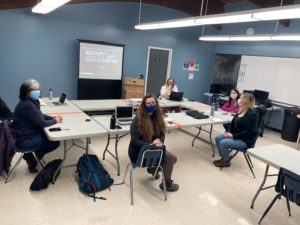Grenfell Campus, Memorial University of Newfoundland and Labrador is located on the west coast of the island of Newfoundland in Canada. Embedded in a rural region with diverse communities, individuals, organizations and industries, Grenfell Campus’ recently released strategic plan “Committing to Communities” responds to the special obligation that Memorial University has to the people of Newfoundland and Labrador. My role as regional engagement and experiential learning coordinator focuses on regional engagement and making connections between the university (faculty and staff) and the communities, individuals, organizations and industries throughout western Newfoundland.

Photo: At Port Saunders Digital Hub, Port Saunders, NL, Canada © Roza Tchoukaleyska
Much of my work entails active listening – listening to the interests, priorities, concerns and ideas of community members, industry partners, municipalities and Indigenous organizations. From these conversations, I connect folks with students and faculty at Grenfell Campus for research, teaching, and learning opportunities. The purpose of this is to co-create research, teaching and learning opportunities and share knowledge and information between all parties.
To build these campus-community partnerships, in-person connections are the most effective way to build trust and a positive relationship. So, what happens during a global pandemic?
Opportunities and challenges of shifting to virtual engagement
COVID-19 forced a shift in the way in which we maintain and build relationships. Face-to-face interactions were replaced with phone calls or videoconferencing. This presented both challenges and opportunities for regional engagement initiatives.
For existing relationships, and some new relationships, online meetings provided an opportunity to connect easily and more frequently with folks. In the past, these meetings would have required expensive and time-consuming travel to and from meetings. As well, video conferencing options increased and offered greater accessibility for those unable to travel. This presented opportunities to continue ongoing projects and make connections during the pandemic; furthermore, it provided an inclusive option for those that may not have been able to participate in the past.
While this opportunity to broaden our reach was motivating, certain challenges presented themselves. The level of technical ability across rural regions differ and transitioning to a virtual world can be challenging for some. As I worked with partners, I discovered some essential practices:
- Active listening
- Taking the time to assist those struggling with new technologies
- Being flexible with respect to mode of communication, whether by computer or phone
A second, larger challenge was the distinct digital divide existing between rural/remote and urban centres. Rural and remote communities and regions with limited access to digital technologies were most impacted by the COVID-19 pandemic and this disparity hindered relationship-building activities. While there was still some ability to connect, some conversations were less meaningful, with participants having to turn off video options in order to preserve the already challenged conversations.
The third challenge relates to establishing new relationships. In my experience during the pandemic, maintaining relationships virtually is a little easier than building new ones. Introducing yourself and creating an environment that supports meaningful connections with new people can be difficult – engaging interactions can be hard to realize when connecting with individuals you have not interacted with in the past.
Finding solutions to virtual ‘dis’connection
With these challenges in mind, Grenfell Campus established two digital hubs in rural communities in western Newfoundland to provide Memorial University students and community members with spaces where they could access reliable and quality internet connections. The aim is to keep these hubs operating into the future and adding to the number of locations available. These spaces have been utilised by post-secondary students, high school students and community members, taking advantage of the internet access and print services available. As well, these hubs have become gathering places for small groups wishing to connect virtually to other groups or individuals, enabling meaningful connections while adhering to social distancing restrictions.
Of course, there are tips “out there” for building meaningful connections online, but some of those interactions are awkward – anybody else miss the icebreaker small talk before starting an in-person meeting? I have included a little bit of small talk and “getting-to-know-each-other conversation” at the beginning of virtual meetings; however, there is no replacement in-person, face-to-face connection.
Connections after COVID
So, where to go from here?
The answer is not to go “back to where we were before,” because now we are aware of the digital divide and have access to more technology.
Ongoing and future engagement initiatives should be “co-created”: it is important to listen to the individuals we’ll be connecting with on how they would prefer to connect and ensure it is the right time to connect. While my preference is in-person meetings, I am open to all forms of communications. Hybrid models are also a great way to encourage inclusivity while providing in-person connections. As time goes on, I am confident that western Newfoundland, a predominately rural region, accessibility to technology will improve for most. I encourage everyone to be ready, willing and able to take advantage of new opportunities to make connections.

Jennifer Buxton (Regional Engagement & Experiential Learning Coordinator, Grenfell Campus Office of Engagement) was born and raised in Biggar, Saskatchewan, Canada. She received a bachelor’s degree in political studies from the University of Saskatchewan. Jenn worked in community engagement and communications roles before moving to Corner Brook, Newfoundland and Labrador in the summer of 2018 with her family. She joined Grenfell Campus in November 2019 and spends most of her spare time with her four-year old daughter doing DIY projects and gardening in the spring/summer.
Are you currently involved with regional research, policy, and development? The Regional Studies Association is accepting articles for their online blog. For more information, contact the Blog Editor at rsablog@regionalstudies.org.